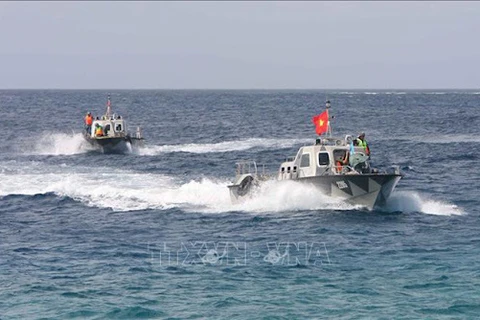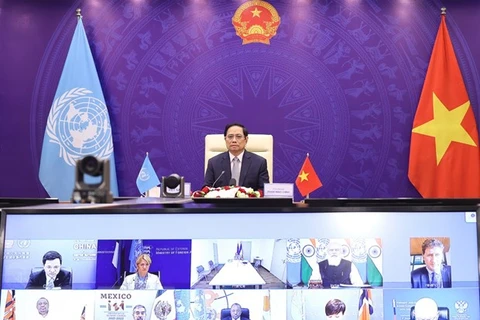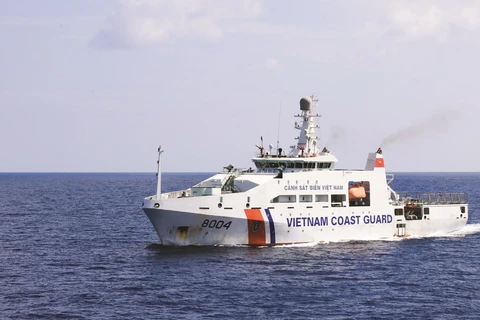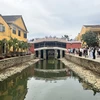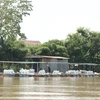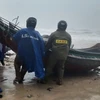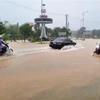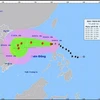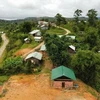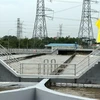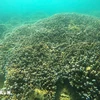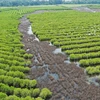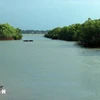Hanoi (VNA) – After the marine pollution scandal caused by the Formosa Ha Tinh Steel Corporation in four central coastal provinces in early 2016, Vietnam’s maritime environment has been kept relatively good, but pollution still occurs in certain aquaculture zones, river mouths, and seaports.
This is part of the national report on maritime and insular environment during 2016 - 2020 recently released by the Ministry of Natural Resources and Environment (MoNRE).
Marine environment under great pressure from waste sources
Minister Tran Hong Ha said this report is the first of its kind on the country’s maritime environment since the 2015 law on maritime and insular resources and environment took effect.
The document provides overall assessment on the situation of maritime and insular environment over the last five years. It serves as a foundation for devising orientations and solutions for effectively managing, preventing, and minimising marine pollution. It is also an important and practical source of information for making and implementing policies on the maritime and insular environment protection in the time ahead.
The report pointed out that during 2016 - 2020, most of waste from the mainland indirectly affected the marine and insular environment via river mouths. Pollution increased in the river mouths running through or near coastal cities.
Statistics show that 74 percent of solid waste in coastal localities was collected in 2019 while the daily volume of wastewater in urban areas amounted to 122 million - 163 million cubic metres, and up to 70 percent of tourist destinations across the country are located in coastal areas. That has not only caused pressure on urban infrastructure but also affected the space of coastal cities, which can be seen most clearly in the change of coastal landscapes as a result of projects reclaiming sea to build resorts.
In terms of waste sources at sea, aquaculture and marine tourism had the greatest impact and directly caused environmental pollution in certain bays and coastal lagoons.
Some environmental incidents triggered by industrial waste release and oil spills, along with growing climate change impacts, have also led to substantial human, property, and infrastructure losses; influenced economic, cultural, and social development; and negatively impacted the marine environment.
According to the report, several environmental incidents caused by the release of industrial waste, typically the pollution in the central region in early 2016 and oil spills, often lead to serious consequences such as worsening environmental pollution, directly affecting sea-based economic activities like tourism, and influencing people’s livelihoods.
Lack of inspectors specialised in maritime environment
The MoNRE said seas and islands play a particularly important role in socio-economic development and sovereignty safeguarding. They form one of the top priorities of the entire political system as seen in the Party Central Committee’s Resolution 36-NQ/TW on the strategy for sustainably developing Vietnam’s maritime economy by 2030, with a vision to 2045. This resolution identifies the marine environment protection as a consistent task.
However, the ministry noted, there remain numerous difficulties in protecting the maritime environment, firstly due to the limited awareness and sense of responsibility towards the work. Short-term economic growth is still preferred to environmental factors and long-term interests. Meanwhile, there is a lack of consistency in sea and island management among localities.
Legal regulations, especially penalties for administrative violations related to maritime resources and environment, are still being made and have yet to be issued. The lack of inspectors specialised in maritime and insular environment has also led to limited supervision of the implementation of rules on marine environment protection.
The MoNRE said Vietnam is working to perfect the State management apparatus on marine environment protection, carry out the key programme on surveying maritime and insular resources and environment by 2030, build a system for marine environment monitoring, complete a relevant database system as well as mechanisms for data management and use, conduct communications to raise public awareness, and train human resources.
Besides, the country is also improving its capacity and strengthening international cooperation in dealing with urgent maritime environmental issues such as managing ocean plastic waste, handling oil spills at sea, conserving marine biodiversity and fishery resources, and preventing pollution caused by vessels./.
This is part of the national report on maritime and insular environment during 2016 - 2020 recently released by the Ministry of Natural Resources and Environment (MoNRE).
Marine environment under great pressure from waste sources
Minister Tran Hong Ha said this report is the first of its kind on the country’s maritime environment since the 2015 law on maritime and insular resources and environment took effect.
The document provides overall assessment on the situation of maritime and insular environment over the last five years. It serves as a foundation for devising orientations and solutions for effectively managing, preventing, and minimising marine pollution. It is also an important and practical source of information for making and implementing policies on the maritime and insular environment protection in the time ahead.
The report pointed out that during 2016 - 2020, most of waste from the mainland indirectly affected the marine and insular environment via river mouths. Pollution increased in the river mouths running through or near coastal cities.
Statistics show that 74 percent of solid waste in coastal localities was collected in 2019 while the daily volume of wastewater in urban areas amounted to 122 million - 163 million cubic metres, and up to 70 percent of tourist destinations across the country are located in coastal areas. That has not only caused pressure on urban infrastructure but also affected the space of coastal cities, which can be seen most clearly in the change of coastal landscapes as a result of projects reclaiming sea to build resorts.
In terms of waste sources at sea, aquaculture and marine tourism had the greatest impact and directly caused environmental pollution in certain bays and coastal lagoons.
Some environmental incidents triggered by industrial waste release and oil spills, along with growing climate change impacts, have also led to substantial human, property, and infrastructure losses; influenced economic, cultural, and social development; and negatively impacted the marine environment.
According to the report, several environmental incidents caused by the release of industrial waste, typically the pollution in the central region in early 2016 and oil spills, often lead to serious consequences such as worsening environmental pollution, directly affecting sea-based economic activities like tourism, and influencing people’s livelihoods.
Lack of inspectors specialised in maritime environment
The MoNRE said seas and islands play a particularly important role in socio-economic development and sovereignty safeguarding. They form one of the top priorities of the entire political system as seen in the Party Central Committee’s Resolution 36-NQ/TW on the strategy for sustainably developing Vietnam’s maritime economy by 2030, with a vision to 2045. This resolution identifies the marine environment protection as a consistent task.
However, the ministry noted, there remain numerous difficulties in protecting the maritime environment, firstly due to the limited awareness and sense of responsibility towards the work. Short-term economic growth is still preferred to environmental factors and long-term interests. Meanwhile, there is a lack of consistency in sea and island management among localities.
Legal regulations, especially penalties for administrative violations related to maritime resources and environment, are still being made and have yet to be issued. The lack of inspectors specialised in maritime and insular environment has also led to limited supervision of the implementation of rules on marine environment protection.
The MoNRE said Vietnam is working to perfect the State management apparatus on marine environment protection, carry out the key programme on surveying maritime and insular resources and environment by 2030, build a system for marine environment monitoring, complete a relevant database system as well as mechanisms for data management and use, conduct communications to raise public awareness, and train human resources.
Besides, the country is also improving its capacity and strengthening international cooperation in dealing with urgent maritime environmental issues such as managing ocean plastic waste, handling oil spills at sea, conserving marine biodiversity and fishery resources, and preventing pollution caused by vessels./.
VNA


